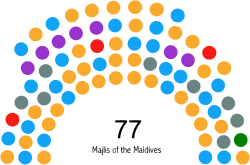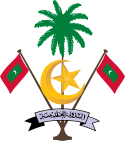- Majlis of the Maldives
-
People's Majlis
ރައްޔިތުންގެ މަޖިލިސް
Type Founded March 9, 1931 Type Unicameral Leadership Speaker Abdulla Shahid, DRP Structure Members 77 
Political groups Dhivehi Rayyithunge Party
Maldivian Democratic Party
People's Alliance
Jumhooree Party
Gaumee Party
IndependentMeeting place 
Website www.majlis.gov.mv Maldives 
This article is part of the series:
Politics and government of
the MaldivesGovernment- People's Majlis
- Speaker
- Abdulla Shahid
- Speaker
- Chief Justice
- Ahmed Faiz
- Courts
- Supreme Court
- High Court
- Magistrates' Courts
Political Parties- List of political parties
- Major Parties:
- MDP
- DRP
- Provinces & Atolls
- Natural Atolls
- Local Councils
The Majlis of the Maldives or the People’s Majlis is the main legislature body of the Maldives. The Majlis has the authority to enact, amend and revise laws, except the constitution of the Maldives. Majlis is composed of 77 members. Each year in the last Thursday of February, the Majlis is opened by the president of the Maldives and in the opening ceremony the president outlines his policies and achievements in his presidential term. The annual budget of the state is also passed by the Majlis.
Contents
History
A council was setup by sultan Muhammad Shamsuddeen III to draft the constitution of the Maldives in 9 March 1931. The council completed and implemented the constitution on 22 December 1932. This constitution was the basis for the formation, of the first ever Majlis of the Maldives. The meetings of this Majlis were held in the “Hakura Ganduvaru”. The first president or the speaker of the Majlis was Al Ameer Mohammed Farid Didi. Maldives was then ruled by a sultan and the advent of the new constitution was seen as a threat to the sultanate. Thus, mobs were instigated against the constitution and it was publicly torn up. Since then the constitution of the Maldives has been revised a number of times.
Members and elections
The entire constitution of the Maldives has been re-written in 2008, and the composition, electorates and powers of the Majlis has changed drastically. For example, the current Majlis has 77 seats, one from each electorate, has an elected speaker from among members, has substantially expanded powers, has been elected in a multi-party election in 2009 and generally resembles the parliament in any liberal democracy.
Two members are elected from each administrative atoll under the present constitution. Another two members are elected from the capital Male’. The president appoints 8 members to the Majlis. In the past the Majlis was fully controlled by the ruling regime but it has changed recently. There are members in the Majlis who have aligned themselves with the opposition parties, although a Multi party election has never been held.
The members are elected for a five year term. Before the ending of the duration for the existing Majlis, a general election is held to elect a new Majlis. Usually a new Majlis is elected thirty days prior to the expiration of the existing Majlis.
Once elected Members begins there parliamentary responsibilities after taking the oath of office, stipulated in article 67 of the present constitution. Members are guaranteed parliamentary immunity under the constitution.
The Speaker
A speaker is elected among the Members. The speaker will chair the meetings of the Majlis, is responsible for maintaining order in the chamber and has to supervise the administrative affairs of the Majlis. The speaker is next in line, to be the acting president in case of a vacancy in the president’s position, until a new council to govern the state is elected. Till date eleven individuals have filled the speakers post in the Majlis.
A deputy speaker is also chosen to assist the speaker of the Majlis, and to overtake and run the Majlis, when the Speaker is absent or is not fit to fulfill the responsibilities of the Speaker.
Sittings of the Majlis
The sittings of the Majlis are divided into three sessions a year. The speaker has the authority to assign the dates for the commencing and closing of the Majlis sessions. For a Majlis session to commence, the meeting should be presided by the speaker or the deputy speaker. The quorum of the Majlis is 26 and this number is required to begin a session of the Majlis. If the quorum is not present, the speaker has to adjourn the session. Most of the Majlis meetings are open to the public.
Committees
There are two types of committees in the Majlis. They are the standing committees and the selected committees. There are eleven standing committees in the Majlis, which is responsible for proposing amendments to bills or matters presented to Majlis floor, researching of the proposed bills or matters presented to the Majlis. Members are elected for a period of two and a half years for the standing committees. The responsibility of the standing committees varies, depending of its purpose.
Unlike the standing committees, the selected committees are temporary and it’s dissolved, once the selected purpose is over. Usually selected committees are made to investigate or research matters related to a present circumstance or an incident. All the committees are chaired by the speaker or the deputy speaker or a person appointed by the speaker. The Majlis decides the number of members to assign to each committee.
Majlis Secretariat
The secretariat of the Majlis was established on 1971. Since then it have been the responsibility of the Secretariat to oversee and facilitate the smooth running of the Majlis. Secretariat supports the Majlis with legislative works, manages the administrative affairs and provides technical support to the members of the Majlis. A secretary general is appointed to run the Majlis secretariat. The speaker supervises the Majlis secretariat.
Legislative Functions
Legislative proposals are introduced to the Majlis as bills. The government or the members present the bills to the Majlis floor. Once the bill is presented, the committee stage begins and the members debate on the provisions of the bill. Members may also propose amendments or propose to pass the bill during the debate. The members also have the right to send the bill to any of the related committee for further research and deliberation. If the bill is sent to the committees then there won’t be any further debate or voting on the bill, until the committee presents its final findings about the bill.
Once the committee stage is over, members cast their votes to decide whether the bill will pass or not. If an amendment is proposed to the bill, the members votes for the amendment first. When the amendments are passed the members vote on to decide the fate of the bill. Once the bill is passed, it is sent to the president within seven days for presidential assent. The president should give his decree on the bill within thirty days or return it to the Majlis for further consideration or consideration of any amendments proposed by the president.
If the bill was not returned to the Majlis by the president or even if the president did not ratify the bill within the thirty day period, the bill is deemed to become law. If the bill is sent back to the Majlis, the members can decide to pass the bill as it was before or they can consider the presidents observations.
References
- (Dhivehi) http://www.majlis.gov.mv — Official Web site
- http://www.presidencymaldives.gov.mv/pages/default.php?ZQE5XDheYQBlEGIOYxc1BTQFZVA=
- http://www.state.gov/g/drl/rls/hrrpt/2004/41741.htm
- http://directory.cpahq.org/directory/default.aspx?orgid=125
External links
- (Dhivehi) http://www.majlis.gov.mv — Official Web site
Parliament of Asia Sovereign
states- Afghanistan
- Armenia
- Azerbaijan
- Bahrain
- Bangladesh
- Bhutan
- Brunei
- Burma (Myanmar)
- Cambodia
- People's Republic of China
- Cyprus
- East Timor (Timor-Leste)
- Egypt
- Georgia
- India
- Indonesia
- Iran
- Iraq
- Israel
- Japan
- Jordan
- Kazakhstan
- North Korea
- South Korea
- Kuwait
- Kyrgyzstan
- Laos
- Lebanon
- Malaysia
- Maldives
- Mongolia
- Nepal
- Oman
- Pakistan
- Philippines
- Qatar
- Russia
- Saudi Arabia
- Singapore
- Sri Lanka
- Syria
- Tajikistan
- Thailand
- Turkey
- Turkmenistan
- United Arab Emirates
- Uzbekistan
- Vietnam
- Yemen
States with limited
recognition- Abkhazia
- Nagorno-Karabakh
- Northern Cyprus
- Palestine
- Republic of China (Taiwan)
- South Ossetia
Dependencies and
other territories- Christmas Island
- Cocos (Keeling) Islands
- Hong Kong
- Macau
Categories:- Government of the Maldives
- Unicameral legislatures
- People's Majlis
Wikimedia Foundation. 2010.
